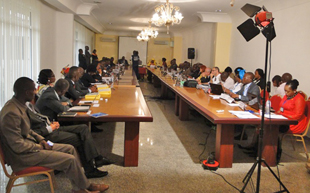In some countries, there is a risk that substandard medicines will be registered by national regulatory authorities because of a lack of technical capacity and poor resourcing. It causes problems not just for the individual country, but for the surrounding region – porous borders mean substandard medicines originating in one poorly-regulated jurisdiction can enter another country if the regulatory system is not strong enough to detect it.
The issue has been recognized by the World Health Assembly, which has urged WHO to engage networks of national regulatory authorities to pool their capacities to promote greater access to quality, safe, efficacious and affordable medical products ( see WHA resolution 67.20).
One of the regions responding to the challenge is Central Africa. “We have regulations and national regulatory authorities which have to authorise any medicine before it is sold or given free to people,” says Emilienne Yissibi, consultant at Organisation for Coordination in the Fight Against Endemic Diseases in Central Africa (OCEAC). “But the system is not very strong – the control is not always as it should be.”
Ensuring the same level of regulatory capacity across the region

Six nations of the subregional economic group, the Central African Economic and Monetary Community (CEMAC), have to resolved to work together to ensure each has the same level of capacity, documents, tools and processes in their regulatory authorities. In 2013, CEMAC Member States adopted a common medicine policy, to standardize institutional and legal frameworks across the region. Dr Yissibi says the common policy is a good foundation, but there is much work ahead.
“Now we have the common policy with common objectives, we have to train regulators and strengthen legislation in each country,” she says. “We have to bring every country to work together to strengthen their legislation and to ensure that legislation is applied and respected.” The implementation of this common policy is being supported by WHO through the EU/ACP/WHO Renewed Partnership which aims to strengthen pharmaceutical systems and improve access to quality medicines in 15 African countries of the African, Caribbean and Pacific Group of States (ACP).
EU/ACP/WHO Renewed Partnership assistance
To improve countries’ ability to harmonize procedures and share resources, a workshop organized by OCEAC was held in Brazzaville in the Republic of Congo from 20-25 July 2015, with WHO technical support and financial support from the EU/ACP/WHO Renewed Partnership. Regulators from Cameroon, the Central African Republic, Chad, Congo, Equatorial Guinea and Gabon took part to build their capacity to evaluate products.
The Coordinator of OCEAC’s Regional Sub-Program Harmonization of National Pharmaceutical Policies in Central Africa, Dr Bernard Aimé Djitafo Fah, says WHO’s efforts through the Renewed Partnership reinforce OCEAC’s efforts to ensure that regulatory authorities across the region have the necessary skills to be able to ensure medicines given to their population meet national standards.
“The challenge is to develop the technical expertise in quality assurance and marketing authorisation,” he says. “They need to adopt the same regulations on all topics and then implement them in each country and, one day, may consider pooling resources to become more efficient.”
In the framework of the same project, WHO and OCEAC are planning other activities aimed at building and strengthening the capacity of national regulatory authorities in Central African countries, and continuing the efforts to ensure the region’s population has access to quality-assured pharmaceutical products and medical devices.
